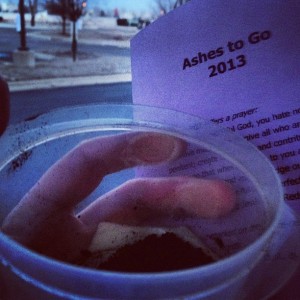Starting early on Ash Wednesday morning, while it was still dark, two church members and I stood in our church driveway and parking lot, wearing white robes and offering ashes to the people driving by. We’re on a relatively busy street, but it was freezing cold and dark and I’m not sure that, before the sun rose, many folks could even see us or what we were doing. But our first pilgrim drove up at 6:10 a.m. She and I read this prayer together, combined from two of the prayers said in the Episcopal Ash Wednesday service:
Almighty and merciful God, you hate nothing you have made, and forgive all who are penitent; create in us new and contrite hearts, so that when we turn to you and confess our sins and acknowledge our need, we may receive your full and perfect forgiveness, through Jesus our Redeemer. Amen.I marked her forehead with ashes saying, “My sister, remember you are dust, and to dust you will return.” I handed her a flyer with the prayers and an explanation about Lent and said, “Go in peace.” Then she drove away.
She was driving to her shift at a local big box store – I know because it turns out one of my parishioners is her coworker. This woman had the first smudged forehead they’d seen that morning and she told Cindy, “I got my ashes from a church on Lily Cache – they were out in the parking lot!”
Cindy said: “Wait, I think that’s MY church!”
Her coworker said, “Please tell them thank you. I can’t go to Mass today but I’m Catholic and I like to get ashes on Ash Wednesday.”
It sounds shallow, I realize, to invite people to “drive thru” and get ashes. Another way church is going retail. Another way church is becoming consumer and convenience driven. Jesus died on the cross and people just lower their window to remember their mortality? Then drive away? Believe me, it took me a few years to get on board here.
I hesitated because I wanted to get my theology straight on this. But it was also because offering “Ashes to Go” meant meeting lots and lots of strangers and offering them something that’s quite intimate and powerful. It was a little scary to think about!
What changed my mind? First, one of my more conservative church members told me she thought we should do it… and she wanted to help make it happen. Her witness pushed me forward.
Second: Jesus’ example. Jesus didn’t sit in synagogues or at home, expectantly waiting for people to come visit him – he was on the road, in the marketplace, out on hills, meeting people out in their lives and places. Are we being faithful Christians, taking His love to those who need it most, by sitting in our churches and waiting for people to join us? Especially when so many people have been burned by their churches; coming back inside could require some emotional bravery, facing down bad memories, and taking the risk of getting hurt again. Many people haven’t grown up in a church at all and might not imagine there’s anything inside for them, or worse, that established Christians wouldn’t welcome them there.
But Jesus called us to be evangelists, to go out into the world, in twos and threes, to minister to the people we meet. Ashes to Go is a form of evangelism that is both socially and theologically appropriate to offer to people out in parking lots and train platforms, sharing God’s love, a call to repentance, and some Christian teaching with “the crowds,” just as Jesus and John the Baptist did. (Admittedly, we left “You brood of vipers” off our prayer card this year.)
Third, getting smudged with ashes isn’t a sacrament. It’s a sign of repentance, it’s an ancient ritual for starting the season of Lent, but it’s not like Baptism or Eucharist. A shared worship that includes ashes is wonderful and powerful, but it’s not essentially tied to the rite.
Baptism, on the other hand, is a lifelong commitment and requires deliberation and preparation. In the Episcopal Church, baptism is always done on a Sunday morning in the midst of a worshipping community. It’s a community event. The Eucharist is also community act, shared between priest and congregation, witnessing to the Body of Christ on the altar and in our midst. I’m sure someone out there has tried it, but offering “drive thru” Communion or Baptism is theologically unthinkable.
However, there are no prerequisites for receiving ashes on Ash Wednesday. You don’t need any classes or meeting with a priest to get ready for it. It’s a form of witness, not a sacrament. It’s a mark of mortality, not of doctrine. It’s a sign of intention to begin a season of prayer and fasting and to choose to draw closer to God, but not necessarily one that requires . And everyone who drove through our parking that morning seemed to know this – and every time we prayed together and marked people with ashes, there was a sense of great reverence. Sometimes tears.
(Then there was the man who stopped to ask what we were doing and when I explained, he pulled away as he said, “I’m sorry, I just don’t have time!”)
Fourth, and finally, Ash Wednesday is a weekday. These days, people work multiple jobs, have kids with multiple schedules, work and go to school simultaneously, and generally are subject to institutions that don’t have much regard for religious observance or people’s family lives. Someone said on my Facebook page, “He gives us SO much, make the time to properly say thank you… People find 60 minutes to catch up on TV.” This is true. Jesus give us so much. But I honestly believe the people who drove through our parking lot that day weren’t trying to cheat him of his due, but were unbelievably grateful to catch a glimpse of him in the midst of all the day was demanding of them. Now, I’m sure there are people who would trade an hour of church for two minutes of drive thru ashes – but are they the ones who are also going to take time to stop and ask strangers to put ashes on their heads? I have a feeling those weren’t the ones who let Stephen, Sheeba, and me pray with them and smudge their faces.
A woman drove up with her teenage daughter in the passenger seat, and said to me in her flat, Chicago accent, “She needs ashes because she can’t go to Mass tonight.” The mom did not receive ashes, because she would get them at church later.
A man on a bike stopped for ashes. A woman and her son stopped and told me they were Baptist, but could they have ashes? A teenage kid walked by on his way to school and asked what the ashes were for. Oh yes, he’s heard about this at his church. He took one of our prayer cards and said would think about it.
One of our own members drove through with her two young sons in the backseat. She has tinted windows, so I didn’t see them when I said the prayer with her and gave her ashes. Five minutes later she was back and told me, “Well, I didn’t realize the boys wanted ashes, but they made me come back!”
Others said to us, “This is so wonderful – thank you so much.” Or “I’m so glad I found you here!” And others said, “What is this? Tell me about the ashes.” A few said, “I really need prayer today.” Some were Roman Catholic, some were not familiar with Lent or Ash Wednesday, and some were our own church members. They were old and young, shabby and well-dressed, White, Latino, and Black.
Sheeba, Stephen, and I also spent a lot of time on the sidewalk, waving at people driving by. Our signage wasn’t great, so I’m sure many folks thought, “Who are those crazy people waving at me?” But many of them waved back. Including lots of school bus drivers and one garbage truck driver who seemed to be thinking very seriously about stopping before he drove on by. Offering ashes was powerful but it was also wonderful to have a reason to wave at people driving to work or school that winter morning – maybe cranky, rushing, or dreading the day ahead. I’m sure they couldn’t hear me alternating between greetings of “Repent! Repent” and “God loves you!” but an astonishing number waved back at us. There’s so little kindness in the world it seems, I was glad we could offer some, even if most people didn’t stop for ashes or prayers.
Most of the people who drove by that morning kept on driving. But about 50 cars stopped, and 74 people received ashes from us that morning. 15 were church members. Many were parents of kids who attend the middle school next door. Most were strangers. None of them have turned up at church since, but that wasn’t the point. The point was to come outside our church walls and witness to Jesus Christ, to admit our sin and mortality, and to proclaim his great love and grace for us and for all. Surely, this is our greatest call as Christian people.




this is beautiful . . . the concept, thought, preparation, act, and reflection. I hear God calling ‘What’s next?’ . . . asking us to consider how to be God’s people to God’s people . . .